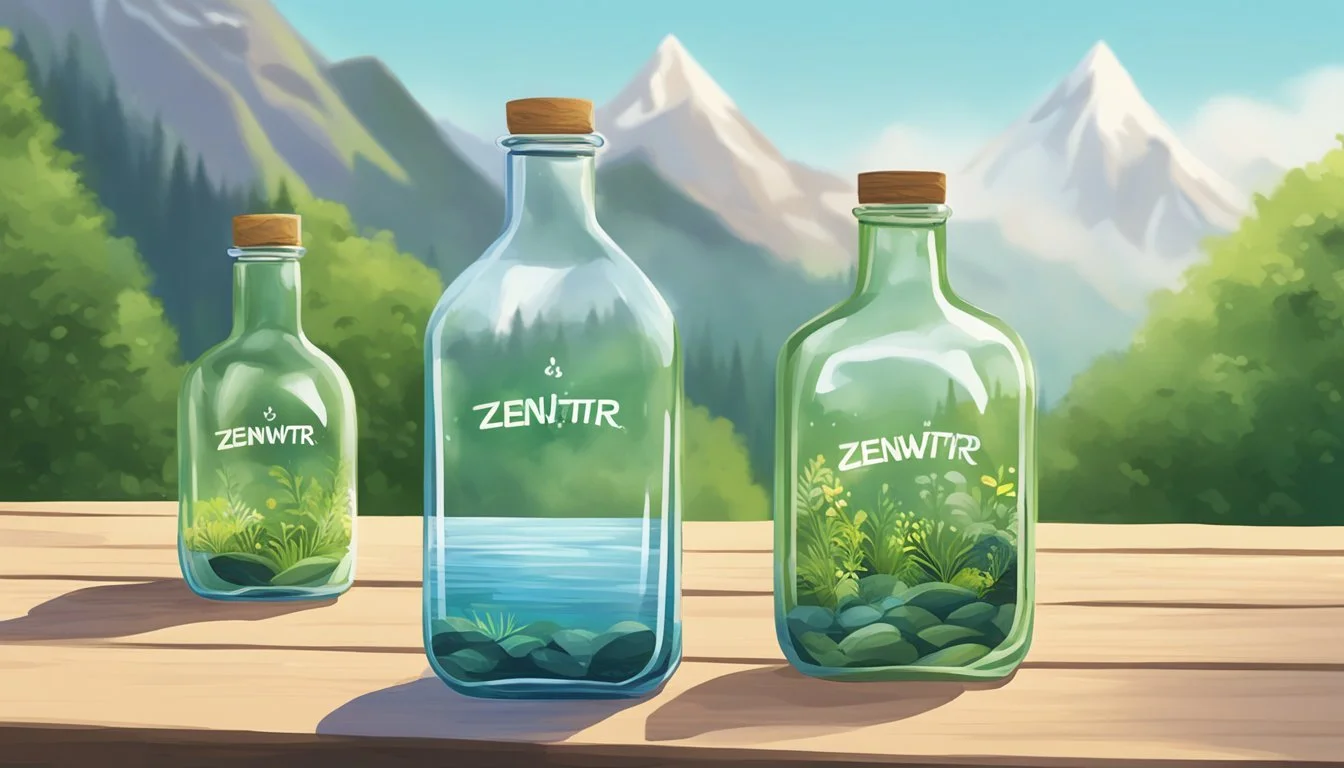Zenwtr vs. Open Water
Ultimate Bottled Water Comparison
When it comes to choosing the best bottled water, ZenWTR and Open Water offer two compelling yet distinct options. ZenWTR stands out with its 9.5 pH alkalinity, designed to provide optimal hydration, particularly for fitness enthusiasts. On the other hand, Open Water appeals to eco-conscious consumers by prioritizing environmentally friendly packaging with aluminum bottles.
Both brands market themselves as sustainable choices, aiming to reduce plastic waste. ZenWTR utilizes bottles made from 100% recycled ocean-bound plastic, whereas Open Water champions the use of infinitely recyclable aluminum. Consumers will find that while both options offer high-quality hydration, they differentiate themselves through their unique approaches to sustainability and packaging.
The choice between ZenWTR and Open Water ultimately comes down to personal preferences regarding pH levels and packaging material. ZenWTR may cater more to athletes and those seeking alkaline water benefits, whereas Open Water targets those deeply committed to reducing their plastic footprint.
Understanding Bottled Water
Bottled water has become a popular choice for hydration, providing various options from purified to mineral-rich varieties. Key factors to consider include market trends, types available, water quality, and health benefits.
The Bottled Water Market Landscape
The bottled water market features intense competition, with brands vying for market share. Products range from spring water to alkaline water. Bottled water often attracts consumers seeking purity and convenience over tap water.
Companies aim to distinguish themselves by bottle design, sustainable practices, or enhanced features like added minerals. Rising awareness about environmental impacts has also influenced the market.
Types of Bottled Water
Spring water is sourced from natural springs and retains its mineral content.
Purified water undergoes processes like distillation, reverse osmosis, or deionization.
Alkaline water has a higher pH level and may offer specific health benefits.
Mineral water is rich in naturally occurring minerals.
Each type targets different preferences and needs.
Determining Water Quality
Water quality is paramount for any bottled water brand. Testing for contaminants and verifying mineral content ensures safety and consistency.
Filtration and purification processes like carbon filtration or UV treatment help achieve high purity levels. Brands often provide quality reports to back their claims.
Assessing the Health Benefits
Health benefits of bottled water include improved hydration and, for some, enhanced mineral intake.
Alkaline water enthusiasts cite benefits like better hydration and acid-neutralizing effects.
Mineral water offers essential nutrients like magnesium and calcium.
Proper hydration supports bodily functions, and choosing the right type of bottled water can complement an individual's health goals.
Comparative Analysis
ZenWTR and Open Water are both contenders in the premium bottled water market, focusing on high pH levels, nutritional benefits, taste, and sustainable packaging. Below, each aspect of these brands is analyzed in detail.
ZenWtr vs. Open Water: PH Levels
ZenWTR boasts an alkaline pH of 9.5. This high pH level is often marketed for its potential health benefits, such as better hydration and neutralizing acid in the body. In contrast, Open Water has a pH level close to 7, making it neutral. The difference in pH levels can affect consumer preference, with some favoring the alkaline properties of ZenWTR for perceived health advantages, while others prefer Open Water’s neutrality.
Nutritional Content: Minerals & Electrolytes
ZenWTR is packed with essential minerals and electrolytes, contributing to its smooth taste and potential hydration benefits. It contains a higher mineral content compared to many other brands. Open Water, on the other hand, focuses on purity with fewer added minerals, resulting in a cleaner taste. Personal preference plays a significant role here, depending on whether the consumer values added minerals and electrolytes or prefers a more straightforward, purified profile.
Taste Profiles: Flavor and Purity
ZenWTR's mineral-rich composition gives it a smoother taste. Its high alkalinity is a distinguishing feature that many consumers appreciate for its mild flavor. Open Water, known for its purity, is processed to remove impurities, resulting in a clean, crisp taste. Preference for taste can vary widely; some might enjoy ZenWTR's subtly enhanced flavor, while others might favor the stark purity of Open Water.
Packaging Innovations
ZenWTR and Open Water both emphasize sustainable packaging. ZenWTR uses recycled and recyclable materials, making it attractive to eco-conscious consumers. Open Water stands out with its 100% aluminum bottles, which are infinitely recyclable. Both brands aim to reduce plastic waste, but their approaches differ, appealing to different segments of environmentally responsible consumers.
By focusing on these critical areas, consumers can make informed choices based on their specific needs and preferences, whether those relate to pH levels, nutritional content, taste, or environmental impact.
Environmental Impact
Zenwtr and Open Water both aim to minimize their environmental footprint through various sustainability measures. These efforts include reducing plastic waste, utilizing recycled materials, and supporting ocean conservation initiatives.
Contribution to Ocean Conservation
ZenWTR commits to reducing ocean-bound plastic by using 100% recycled ocean-bound plastic for its bottles. This initiative targets plastic pollution in at-risk coastal environments, helping to conserve marine ecosystems.
Open Water supports ocean conservation through its partnerships with organizations such as the Ocean Foundation. These collaborations focus on protecting marine habitats and reducing plastic pollution.
Both brands actively contribute to cleaner oceans, but ZenWTR's specific use of recycled ocean-bound plastic stands out as a significant effort towards ocean conservation.
Eco-Conscious Initiatives
ZenWTR emphasizes sustainability by continuously striving to lower its environmental impact. The brand is the first to produce bottles from 100% recycled, certified ocean-bound plastic. This approach minimizes plastic waste and reduces reliance on virgin plastic.
Open Water also demonstrates its commitment to sustainability by using aluminum packaging, which is infinitely recyclable. Aluminum bottles have a significantly lower environmental footprint compared to single-use plastics.
Both brands highlight their dedication to eco-conscious practices, yet ZenWTR’s focus on recycling ocean-bound plastic showcases a unique, impactful strategy.
The Role of Recycling
Recycling plays a crucial role in both ZenWTR and Open Water's strategies to combat plastic pollution. ZenWTR’s bottles, crafted from 100% recycled ocean-bound plastic, address the plastic waste problem directly. This method ensures less plastic enters the ocean, protecting marine life.
Open Water's use of aluminum, a material with a high recycling rate, supports a sustainable packaging solution. Aluminum can be recycled indefinitely without degrading in quality, making it a viable alternative to traditional plastic bottles.
While both companies prioritize recycling, ZenWTR’s use of recycled ocean-bound plastic highlights a focused effort on collecting and repurposing waste materials from vulnerable coastal areas.
Consumer Considerations
When comparing ZenWTR and Open Water, several factors influence consumer decisions. These include the price point, ease of access, and alignment with brand values and standards.
Price as a Determining Factor
For many consumers, price is a significant factor influencing the purchase of bottled water. ZenWTR, marketed as a premium product, generally commands a higher price. In comparison, Open Water often offers more competitive pricing without compromising on quality. The value proposition ultimately depends on personal preference and how much one is willing to spend on water.
Accessibility and Convenience
Accessibility and convenience also play crucial roles in consumer behavior. ZenWTR is readily available in many health food stores, gyms, and online platforms, making it convenient for the health-conscious consumer. Open Water, with its focus on environmental sustainability, is often found in eco-friendly stores and online. Availability in local markets and online options offer convenience, making it easier for consumers to purchase their preferred brand.
Brand Values and Standards
Both companies emphasize their commitment to sustainability, appealing to the conscious consumer. ZenWTR is promoted as a certified plastic negative brand, which resonates with eco-conscious buyers. Founded by Lance Collins, it reflects high standards in environmental responsibility. Open Water, on the other hand, focuses on reduced carbon footprint and recyclable packaging. The alignment of these values with the consumers’ own beliefs can significantly impact their purchase decisions.
Practical Insights
Choosing between ZenWTR and Open Water involves evaluating key factors such as hydration techniques, impact on physical activity and metabolism, and optimal water intake strategies. Each factor provides specific benefits crucial for maintaining overall health and enhancing physical performance.
Proper Hydration Techniques
Proper hydration ensures bodily functions and fluid balance are maintained. ZenWTR, with a pH of 9.5, offers natural alkalinity, which can aid in balancing acidity in the body.
Open Water, known for its clean taste, is produced using a thorough purification process. Regular intake of either water ensures optimal H₂O levels, supporting digestion and nutrient absorption. Drinking water before, during, and after physical activity helps maintain fluid balance and enhances performance.
Influence on Physical Activity and Metabolism
Hydration significantly affects physical performance and metabolism. ZenWTR's alkaline nature can reduce acid buildup during intense exercise, potentially improving endurance. Open Water's minimal mineral content, while providing pure hydration, may be preferred for those seeking a neutral taste without added minerals.
Both brands support metabolic processes that generate energy from food, essential for workouts. Staying hydrated helps in regulating body temperature and reducing fatigue, which is critical during physical exertion.
Optimal Water Intake Strategies
Daily water intake varies by individual needs, but the general advice is eight 8-ounce glasses per day. ZenWTR’s higher mineral content can be beneficial for those engaging in extensive physical activity by replenishing essential electrolytes lost through sweat.
For those who prioritize pure, clean water without additional minerals, Open Water serves as a reliable option. Establishing a hydration routine, such as drinking water first thing in the morning and continuously throughout the day, ensures consistent hydration. Both brands provide convenient options for maintaining daily water intake.
Concluding Thoughts
When deciding between ZenWTR and Open Water, multiple factors come into play.
Impact on the Environment:
Both brands emphasize sustainability. ZenWTR bottles are made from 100% recycled ocean-bound plastic, which helps reduce plastic waste. Open Water, on the other hand, uses eco-friendly aluminum bottles, which are infinitely recyclable and have a lower environmental footprint.
Taste and Quality:
ZenWTR provides naturally alkaline water with a pH of 9.5, attributed to its higher mineral content. This results in a smooth and invigorating taste. Open Water offers purified drinking water that is crisp and clean, appealing to those who prefer a more neutral water profile.
Price Point:
ZenWTR is positioned in the higher-end market segment, typically priced between $2 to $3 per bottle. In contrast, Open Water's prices can vary but generally offer a more competitive option for eco-conscious consumers.
Consumer Preferences:
Conscious consumers looking to make an environmentally friendly choice might lean towards either brand depending on their priorities. Those who prioritize reducing ocean plastic may prefer ZenWTR, while those focused on recyclability may choose Open Water.
In summary, both ZenWTR and Open Water cater to environmentally aware consumers, with distinct advantages in taste, quality, and environmental impact. Choosing the better option would depend on individual preferences and environmental priorities.
More About Zenwtr
Mountain Valley Spring Water vs Zenwtr: Which Bottled Water is Better?
Richard's Rainwater vs Zenwtr: Which Bottled Water is Better?
Whole Foods Italian Still Mineral water vs Zenwtr: Which Bottled Water is Better?
Zenwtr vs Kirkland Signature: Which Bottled Water is Better?
More About Open Water
Aqua Carpatica vs Open Water: Which Bottled Water is Better?
Cascade Mountain vs Open Water: Which Bottled Water is Better?
Core Hydration vs Open Water: Which Bottled Water is Better?
Crystal Geyser vs Open Water: Which Bottled Water is Better?
Hawaii Volcanic vs Open Water: Which Bottled Water is Better?
Hawaiian Springs vs Open Water: Which Bottled Water is Better?
Icelandic Glacial vs Open Water: Which Bottled Water is Better?
Mountain Valley Spring Water vs Open Water: Which Bottled Water is Better?
Nestle Pure Life vs Open Water: Which Bottled Water is Better?
Open Water vs Kirkland Signature: Which Bottled Water is Better?
Open Water vs Whole Foods 365: Which Bottled Water is Better?
Richard's Rainwater vs Open Water: Which Bottled Water is Better?
San Pellegrino vs Open Water: Which Bottled Water is Better?
Solan de Cabras vs Open Water: Which Bottled Water is Better?
Talking Rain AQA vs Open Water: Which Bottled Water is Better?
Whole Foods Italian Still Mineral water vs Open Water: Which Bottled Water is Better?





